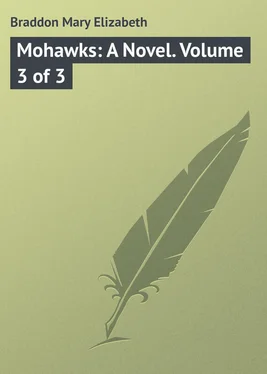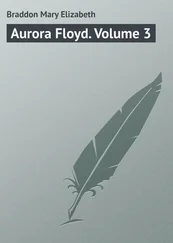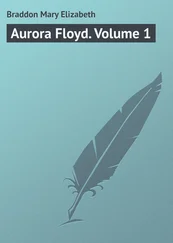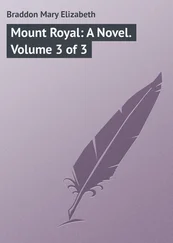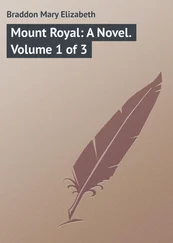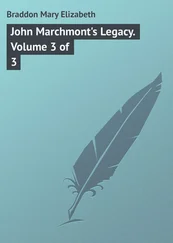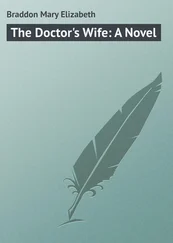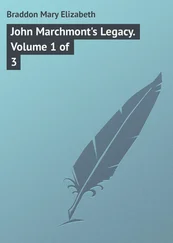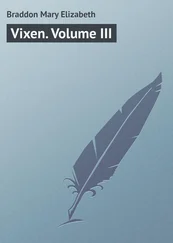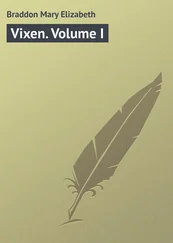Mary Braddon - Mohawks - A Novel. Volume 3 of 3
Здесь есть возможность читать онлайн «Mary Braddon - Mohawks - A Novel. Volume 3 of 3» — ознакомительный отрывок электронной книги совершенно бесплатно, а после прочтения отрывка купить полную версию. В некоторых случаях можно слушать аудио, скачать через торрент в формате fb2 и присутствует краткое содержание. Жанр: foreign_prose, на английском языке. Описание произведения, (предисловие) а так же отзывы посетителей доступны на портале библиотеки ЛибКат.
- Название:Mohawks: A Novel. Volume 3 of 3
- Автор:
- Жанр:
- Год:неизвестен
- ISBN:нет данных
- Рейтинг книги:5 / 5. Голосов: 1
-
Избранное:Добавить в избранное
- Отзывы:
-
Ваша оценка:
- 100
- 1
- 2
- 3
- 4
- 5
Mohawks: A Novel. Volume 3 of 3: краткое содержание, описание и аннотация
Предлагаем к чтению аннотацию, описание, краткое содержание или предисловие (зависит от того, что написал сам автор книги «Mohawks: A Novel. Volume 3 of 3»). Если вы не нашли необходимую информацию о книге — напишите в комментариях, мы постараемся отыскать её.
Mohawks: A Novel. Volume 3 of 3 — читать онлайн ознакомительный отрывок
Ниже представлен текст книги, разбитый по страницам. Система сохранения места последней прочитанной страницы, позволяет с удобством читать онлайн бесплатно книгу «Mohawks: A Novel. Volume 3 of 3», без необходимости каждый раз заново искать на чём Вы остановились. Поставьте закладку, и сможете в любой момент перейти на страницу, на которой закончили чтение.
Интервал:
Закладка:
"I think I had best take my wife from the reach of your violence, sir, now that I have convinced you that I did you no wrong in marrying her," said Durnford, with his arm round Irene, as if to shelter her in this moral tempest, this confusion and upheaval of all the baser elements in human nature.
"Take her away. Yes, remove her from my sight at once and for ever. Let me forget how I have loved her, that I may less deeply loathe her."
"Father," cried Irene piteously, holding out her arms to him, "do not forget that you have loved me, and that I have returned your love measure for measure. Is there no tie but that of blood? I have been brought up under your roof, and you have been kind to me, and I am sure I love you as much as daughters love their fathers. If you scorn me, do not scorn my love."
"You poor beggar's brat," muttered the Squire contemptuously, yet with a relenting look at the pale pathetic face, "you are the lightest sinner of them all, perhaps. But to have been cheated – to have taken a vagabond's spawn to my breast – "
"She is no vagabond's child, but of as gentle blood on the father's side as your own. She comes of a good old Hampshire family – as old as William the Norman. Her father was Philip Chumleigh, the son of a younger son, a gentleman born and bred."
"I thought as much when I saw him dead and stark upon Flamestead Common," said the Squire. "So-ho, mistress," to Bridget, who came in with a cowed air, and guilt written in every feature; "you were in the conspiracy to cheat your master with a supposititious child; but I'd have you to know that you were accomplice in a felony, for which you shall swing higher than Jack Sheppard, if there's justice in this land."
"O sir, is it hanging?" exclaimed the nurse, "and I as innocent as the unborn babe. Never would such a thought have come into my head, to put another into my darling's place; but she made me do it, and I was half distracted – loving them both so well – so full of sorrow for the little angel that was gone, and of tenderness for her that was left, and she – Mrs. Layburne – threatened me she would say 'twas by my neglect my precious treasure died, though God knows I neglected nothing, and watched day and night. But I was scarcely in my right senses; so I gave way, and held my tongue, and once done it was done for ever – there was no going back upon it. And when I saw your honour so fond of my pretty one, and she growing nearer and dearer to you every day, I thought it was well as it was. You had something to love."
"Something, but not of my own blood – something that had no right to my affection, an impostor, an alien, a sham, a cheat, a mockery. You had better have poisoned me, woman. It would have been a kinder thing to do."
"It was her doing," sobbed Bridget, pointing to Mrs. Layburne, who listened and looked on with a ghastly smile, the exultation of a fiend doomed to everlasting torment, and rejoicing in the agony of another. "'Twas all her doing, and I knew it was a sin, and have been troubled with the thought of it ever since; yes, I have never known real peace and comfort since I did her bidding. But she told me 'twas a good thing to do; your heart was so set on the child that it would all but kill you to lose her, and one child was equal to another in the sight of God, and the one that was left would grow up to be a blessing to you, did you but think she was your daughter; and so I yielded, and let her lie to you. But, O sir, as you are a Christian, do not punish that innocent lamb for our sin. Do not take your love from her."
"It is gone," cried the Squire. "She has become hateful to me."
"She shall trouble you no more, sir," said Irene, with a quiet dignity, which moved her husband almost to tears. "I am very sorry that you should have been cheated, but you must at least own that I have been an innocent impostor. You have been very good to me, sir, and I have loved you as a father should be loved, and though you may hate me, my heart cannot turn so quickly. It cleaves to you still, sir. Good-bye."
She dropped on her knee again and kissed his reluctant hand, then put her hand in her husband's, and glided from the room with him, Mdlle. Latour following.
"We had best go back to London in the coach that brought us," said Herrick. "Will you come with us, Mademoiselle, or will you follow us later?"
"I will follow in a day or two," answered the little Frenchwoman. "It would seem like sneaking away to go to-day. I will wait till the tempest is lulled. I am really sorry for that poor man, savage as he is in his chagrin and disappointment; I will see the end of it. That woman is a devil."
"Can you forgive me, Rena, for having sprung this surprise upon you?" asked Herrick, drawing his young wife to his breast, and kissing away her tears. "Or do I seem to have been cruel? I feared your courage might fail if I told you what was coming: and I wanted to have you face to face with your sham father and that wicked witch yonder. I was prepared for her denial of the facts."
"How did you make this discovery, Herrick?"
"That is a long story, dearest. You shall know all about it by and by. And now, dear love, you are my very own. No tyrannical father can come between my orphan wife and me. We stand each alone, love, and all in all to each other."
"I am content to be yours and yours only," she said, looking up at him with adoring eyes. "But I hope my – I hope Mr. Bosworth will forgive me some day."
"Be sure he will, my pet, and that he loves you dearly at this moment, though he roars and blusters about hatred. All will come well, dearest, in the end."
"And you have married a pauper, after all," said Irene.
"I have married the girl I love, and that is enough for me," answered Herrick. "But it is not so clear to me but that I have married a fortune into the bargain. Wait and see, love; the end has not come yet. And now settle your hood and wrap your cloak round you, and we are off again for London."
And thus, clinging to her husband's arm, she who had so long been called Irene Bosworth left the home that had seemed her birthplace. It had been a solitary joyless life which she had lived there, for the most part, yet she looked back at the old panelled hall with a sigh of regret, the instinctive yearning of an affectionate nature.
"We are as unfettered as our first parents, Irene, and the world is before us," said Herrick gaily, as he lifted her into the coach. "Back to Kingston, my men," to the postillions. "We will stay at the inn there to-night, and go on to London to-morrow morning."
"Go," said the Squire to Bridget, when the door had closed upon his sometime daughter; "go about your business, woman, and consider yourself lucky if I do not send you to gaol."
"You had better think twice of that, Squire," said Mrs. Layburne. "To have this business out before a magistrate might lead to the asking of strange questions."
"Do you think I care what questions they ask?" cried Bosworth scornfully. "Do you suppose I am such an arrant cur as to quail before my fellow-worms because I have lived my own life, crawled upon this earth after my own fashion, and not wriggled in their particular mode? No, Barbara Layburne, if I have been a profligate, I have at least been a bold sinner, and I have never feared the face of a man. Were not the grip of death upon you, madam, you should answer to the law for the trick you have played me."
"What if it was an accident?" asked Barbara; "both the children were so reduced by sickness out of their own likeness, that one might easily mistake one for another."
" Youcould not. 'Twas you called my attention to the scar upon the baby's arm when she was but an hour in this house."
"Ay, I remember. I bade you mark it well. I had it in my mind even then to ring the changes on you – to cheat you out of a daughter – you who had cheated me out of name and honour, the world's respect, and a good husband – for I might have made a good match, were it not that I was a slave to my passion for you. When I came into this house and met only scorn and ignominy, I resolved to be quits with you. I have lain awake many a night trying to hit upon the way; but the devil himself would not help me to a plan till you brought that beggar's brat into the house. Then in a moment I saw the chance of being even with you. I knew how you prided yourself on your ancient race, how you heaped up riches, caring not as other men care for the things that gold can buy: only caring for wealth as misers care for it, to heap moneybags upon moneybags. I knew you had made your scheme of leaving a vast fortune, as Marlborough did t'other day, marrying your child to a great nobleman, leaving your name among the mighty ones of the land. I knew this, for though you were rarely civil to me, you could not help confiding in me; 'twas an old habit that remained to you from the days when we were lovers. I knew this, and I meant to drag your pride in the dust; and so, as the whole scheme flashed upon me, I bade you note the cicatrice on the baby's arm, so that when my hour came you should see the sign-manual of the lie that had been foisted on you. Your son-in-law has anticipated me by a short time – that is all. My play is played out."
Читать дальшеИнтервал:
Закладка:
Похожие книги на «Mohawks: A Novel. Volume 3 of 3»
Представляем Вашему вниманию похожие книги на «Mohawks: A Novel. Volume 3 of 3» списком для выбора. Мы отобрали схожую по названию и смыслу литературу в надежде предоставить читателям больше вариантов отыскать новые, интересные, ещё непрочитанные произведения.
Обсуждение, отзывы о книге «Mohawks: A Novel. Volume 3 of 3» и просто собственные мнения читателей. Оставьте ваши комментарии, напишите, что Вы думаете о произведении, его смысле или главных героях. Укажите что конкретно понравилось, а что нет, и почему Вы так считаете.
